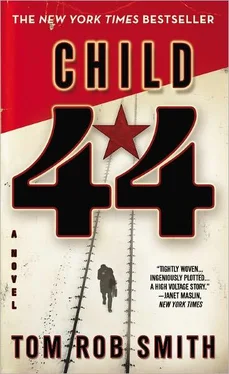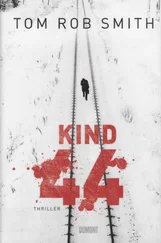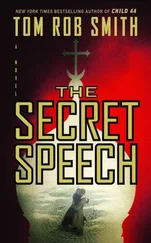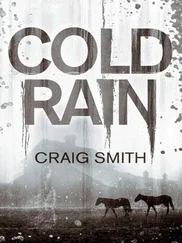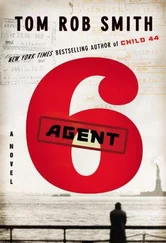Rolling close to the enormous steel wheels, he pulled himself away, facing the end of the train. The body in the wire was rapidly approaching, tangled up on the left-hand side. He positioned himself accordingly. He could do nothing but wait, making himself as small and as flat as possible. The end of the train was nearly over him. He lifted his head up off the ground just long enough to see that it wasn’t Raisa. She’d survived. He had to do the same. He lay down flat and closed his eyes.
The dead body brushed over him.
Then, pain — a single stray hook caught his left arm. He opened his eyes. The hook had cut through his shirt, into his flesh. With only a fraction of a second before the wire went taut, pulling him along, he grabbed hold of the hook and tugged it out, taking a clump of skin and flesh with it. He clutched his arm: feeling dizzy as blood seeped from the wound. Staggering up, he saw Raisa hurrying towards him. Ignoring the pain, he put his arms around her.
They were free.
Same Day
Vasili wasn’t well. He’d done something he’d never done before — he’d taken time off work. Not only was such behaviour potentially dangerous, it was out of character. He’d rather be ill at work than ill at home. He’d managed to rig his accommodation arrangements so that he was, for the most part, able to live alone. He was married, of course; it was unthinkable that a man could remain single. It was his social duty to have children. And he’d followed the rules accordingly, marrying a woman with no opinions, or at least none that she expressed, a woman who’d dutifully given birth to two children — the minimum acceptable if no questions were to be asked. She and the children lived in a family apartment on the outskirts of the city while he occupied an inner-city work address. He’d arranged this ostensibly so that he could have his pick of mistresses. In fact, he partook in extra-marital affairs only very occasionally.
After Leo’s exile to the Urals, Vasili had petitioned to move into Leo and Raisa’s apartment; apartment 124. He’d got his wish. The first few days had been enjoyable. He’d ordered his wife to go to the spetztorgi , the restricted shops, to buy fine food and drink. He’d held a work party in his new apartment, no wives allowed, where his new deputies drank and ate and congratulated him on his success. Some of the men who’d served under Leo now reported to him. Yet despite all these ironies and the delicious reversal of fortune he hadn’t enjoyed the party. He felt empty. He no longer had anyone to hate. He no longer had anyone to scheme against. He was no longer irritated by Leo’s promotion or efficiency or popularity. There were other men who he competed with but the feeling wasn’t the same.
Vasili got out of bed and decided he’d drink himself better. He poured a large measure of vodka and stared at the glass, swishing the liquid from side to side, unable to raise it to his lips. The smell made him feel sick. He put the glass down. Leo was dead. Soon he would receive official notification that the two prisoners had not arrived at their destination. They’d died en route as so many did, after getting into a fight over shoes or clothes or food or whatever. It was the final defeat of a man who’d humiliated him. Leo’s very existence had been a kind of perpetual punishment for Vasili. So, then, why did he miss him?
There was a knock. He’d expected the MGB to send round men to authenticate his illness. He walked to the door, opening it, seeing two young officers standing before him.
— Sir, two prisoners have escaped.
He could feel the dull ache inside him vanishing as he said the name:
— Leo?
The officers nodded. Vasili was feeling better already.
Two Hundred Kilometres South-East of Moscow
Same Day
Half running, half walking, constantly looking behind them — their speed depended on whether fear or exhaustion had the upper hand. The weather was in their favour: weak sunshine and thin cloud, not too hot, at least compared to the inside of that carriage. Leo and Raisa knew from the position of the sun that it was late afternoon but had no way of knowing the exact time. Leo couldn’t remember where or how his watch had been lost or if it had been taken. He estimated they had at the most a four-hour head start on their guards. A rough calculation put their speed at eight kilometres an hour whilst the train had been moving not much more than an average of sixteen, putting a distance of some eighty or so kilometres between them. That was a best-case scenario. It was possible the guards might have been alerted to the escape much sooner.
They broke out of woodland into open countryside. Without the cover of trees they were visible for kilometres. They had no choice but to continue, exposed as they were. Seeing a small river at the bottom of an incline they adjusted direction, picking up speed. It was the first water they’d come across. Reaching it they dropped to their knees drinking greedily, cupping their hands, scooping it into their mouths. When this wasn’t enough, they submerged their faces. Leo joked:
— At least we’ll die clean.
The joke had been misjudged. It wasn’t enough that they do their best to stop this man. No one would appreciate their attempt. They had to succeed.
Raisa focused on Leo’s injury. The gash wasn’t closing; it wouldn’t stop bleeding, too much of the skin and flesh had been ripped. The strip of shirt they’d tied around it was now soaked with blood. Leo unpeeled the shirt.
— I can put up with it.
— It’s leaving a powerful scent for the dogs.
Raisa stepped out of the river, approaching the nearest tree. A spider’s web had been spun between two branches. Very carefully she broke the web with her fingers, transferring it whole and laying it across the ripped flesh of Leo’s upper arm. Immediately blood seemed to solidify upon touching the thin silver lines. She worked for several minutes, searching for more webs, finding them, collecting them and layering them, until the injury was criss-crossed with silky threads. By the time she’d finished the bleeding had stopped.
Leo remarked:
— We should follow this river for as long as possible. The trees are the only cover and the water will hide our smell.
The water was shallow, knee deep at the deepest point. Not fast enough or powerful enough so that they could float and drift with the current. Instead they had to walk. Hungry, exhausted, Leo knew there was only so long they could keep this up.
While guards were indifferent to whether prisoners lived or died, escape was unpardonable. It made a mockery not only of the guards but of the entire system. No matter who the prisoners were, no matter how unimportant, their escape made them important. The fact that Leo and Raisa were already classified as high-profile counter-revolutionaries would make their escape a matter of countrywide significance. Once the train had come to a stop and the guards had noticed the dead body caught up in the wire a count would be done of all the prisoners. The escapees’ carriage would be identified; questions would be asked. If answers weren’t given prisoners might be shot. Leo hoped that someone would be sensible enough to tell the truth immediately. Those men and women had already done more than their share to help them. Even if they confessed there was no guarantee that the guards wouldn’t make an example out of the entire carriage.
The hunt would begin along the tracks. They’d use dogs. A pack of trained dogs travelled with every train, kept in far better conditions than the human cargo. If a sufficient distance had been established between their point of escape and the point at which the search began then the beginning of the scent trail would be difficult to find. Considering the fact they’d been on the run for maybe three-quarters of a day without sight of their pursuers Leo could only presume this was the case. It meant Moscow would be notified. The search would be broadened. Trucks and cars would be mobilized — the possible escape area divided up into grids. Planes would scour the countryside. Local military and security organizations would be informed, their efforts coordinated with national organizations. They would be hunted with a zeal that went far beyond professional duty. Rewards and bonuses would be offered. There was no limit to the manpower and machinery that could be thrown after them. He should know. He’d been involved in these hunts himself. And that was their only advantage. Leo knew how their hunts were organized. He’d been trained by the NKVD to operate unseen behind enemy lines and now the enemy lines were his own borders, borders he’d fought to protect. The size of these searches made them heavy handed, difficult to manage. They’d be centralized, vast in sweep but inefficient. Most importantly he hoped they’d target the wrong area. Logically Leo and Raisa should be heading to the nearest border, towards Finland, the Baltic coast. A boat was their best chance of getting out of the country. But they were heading south — through the very heart of Russia, towards the city of Rostov. In this direction there was almost no chance of freedom, no promise of safety at the end.
Читать дальше
